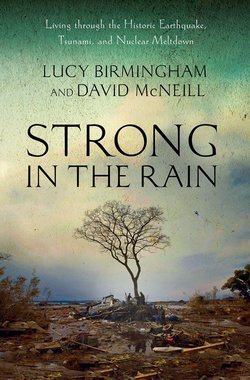I received a phone message from my Nisei Aunt Lorna in Barrie, ON:
“Norman, I just saw a news report on CTV news about a group of students from Malvern Collegiate in Toronto who are going to Japan to see the 3/11 disaster zone. The Japanese Consul-General, Eiji Yamamoto, says that Tohoku is ‘fully recovered’ from the disaster. What’s going on?! That’s not what Linda Ohama is saying.”
“What a crock,” I couldn’t help but think.
I called her back and we discussed the recent reports from the J-government downplaying the radiation levels in Fukushima inferring, of course, that starting up the nuclear reactors would pose no “serious” health threat.
* * * * *
Strong in the Rain was written by journalists Lucy Birmingham and David McNeill who live and work in Tokyo. The book provides readers with a good overview of what is in fact a vast subject especially given that it includes the Fukushima nuclear reactors issue and the communities affected by them—the communities that were completely wiped out by the tsunami—and then all of the lives lost, missing, and the aftermath of the survivors, in particular the orphans. This disaster then takes on its own complex, epic narrative.
As both Birmingham and McNeill experienced the earthquake in Tokyo, albeit from 300 kilometers away from Tohoku, there is an honesty in their telling of this story that makes this book particularly compelling and deserving of our attention.
Strong in the Rain weaves the writers’ personal tales with those of six main characters: Kai Watanabe, a 27-year-old TEPCO (Tokyo Electric Power Corporation) employee, from Okuma, Fukushima; Katsunobu Sakurai, mayor of Minamisoma, Fukushima; Yoshio Ichida, 53, a Minamisoma fisherman; Touru Saito, a Tohoku University-bound student from Oginohama, Miyagi; David Chumreonlert, a 29-year-old American English teacher in Higashi-Matsushima, Miyagi; and school cook, Setsuko Uwabe of Rikuzentakata, Iwate.
The impact of the statistics alone is staggering: 340,000 people displaced; 19,125 dead or missing (as of March 2012); 22 million tons of rubble piled up on the outskirts of coastal towns that other prefectural governments refuse to accept because of fears of radioactive contamination; 300 fishing ports either completely destroyed or damaged; 50,000 to 120,000 people have moved “voluntarily” because of fears of radiation ignoring official government claims that life inside Fukushima is safe.
At the moment, the mass media is preoccupied with news about the massive amounts of flotsam washing ashore here in North America and the odd bit of news about the nuclear situation in Fukushima.
Besides CBC TV’s Mark Kelley’s Fifth Estate report (“The Second Wave”) which focused on a fishing boat that washed up on a British Columbia shore and the finder’s remarkable effort to meet the owner, I have not seen the media go to any lengths to report about the ongoing human toll in Tohoku—those who continue to struggle with post traumatic stress disorder and loss that is incomprehensible to most of us.
So much is made of how the Japanese cope with disaster in their own stoic way that it has become a cliché. While there might be some truth to the cultural values that include “gaman” (patience), “shikataganai” (it can’t be helped), and “gambare” (perseverance), there surely is more truth in the idea that the Nihonjin suffer as any people do.
The best writing about Japan is done so with a recognition of these cultural values without going so far as to stereotype the people. Birmingham and McNeill have written with a balance of truth and compassion.
The 3/11 aftermath…for the sake of the children
I have a deep and personal stake in the 3/11 recovery effort as so many friends have been affected.
My friend Shogo Horiuchi, a former student, grew up in Minamisoma where his dad was a school principal. His family house was completely destroyed by the tsunami and the rice fields flooded by seawater. His family, including nephews and nieces, still live there.
Shogo-san recently wrote in an email:
“My family is good. Today I went to my home town Minamisoma city. Here are many temporary housings. Reconstruction is delayed.” For the past year he has lived and worked in Yamagata-ken.
As a Canadian, I am particularly moved by the help that Canadians continue to offer. Vancouver’s Linda Ohama was one of the “first responders” who organized a fundraiser at the Queen Elizabeth Theatre in Vancouver. After that, she organized a remarkable “Cloth Letter” making campaign in Canada which evolved into a touring exhibit around Japan. Linda, an award winning filmmaker, is now in the process of making a new “doc” about the 3/11 aftermath.
There is also the amazing work of Monkey Majik, a Sendai-based rock band led by Canadian brothers Maynard and Blaise Plant who have organized many fundraising concerts in Japan, Canada, and the U.S.
Other friends in Sendai including Tsutomu Nambu, Senji Kurosu, and Australian ex-pat James Davies continue to do volunteer work too.
Still, mountains of debris occupy the vast spaces where communities once stood. They need to be cleared away. Then…deep breath…decades, if not generations, will still be needed to rebuild lives there.
Strong in the Rain is a stirring tribute to the indomitable spirit of the people of Tohoku and, ultimately, to what that blessed region of Japan will one day become again.
* * *
Strong in the Rain by Lucy Birmingham and David McNeill
ISBN: 989-0-230-34186-9
Publisher: Palgrave Macmillan, 2012
226 pages, $31 (CDN) / $27 (USD)
www.palgrave.com
© 2013 Norm Ibuki







